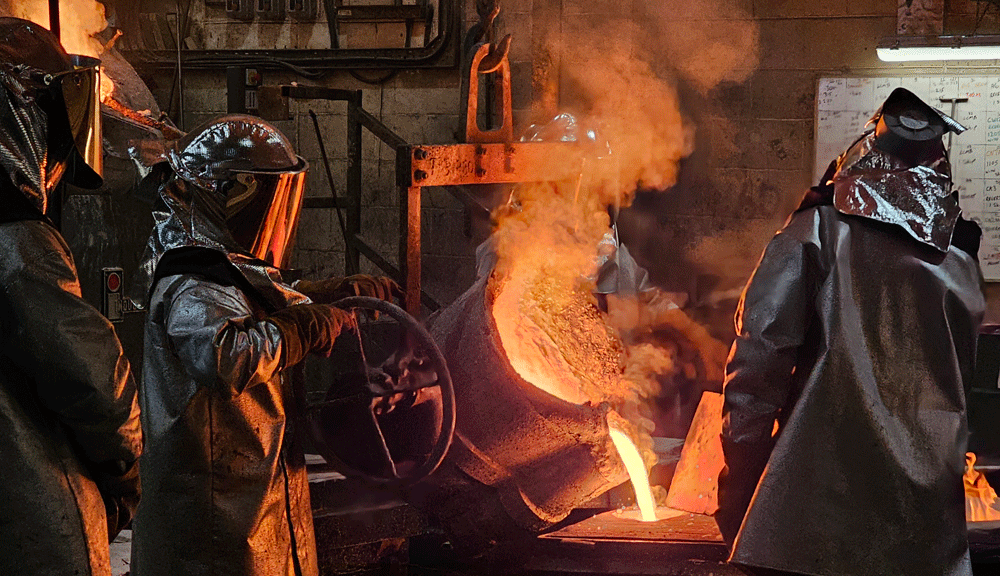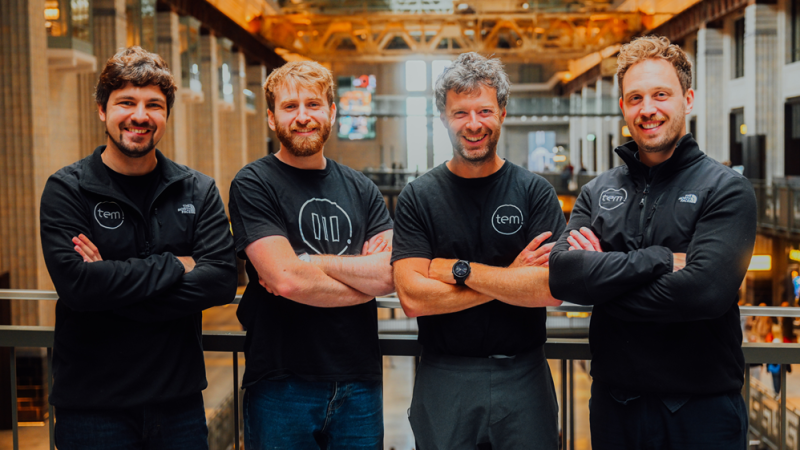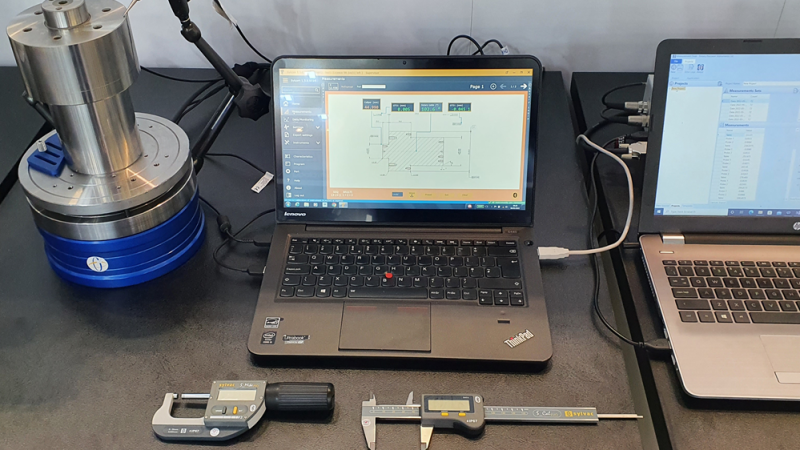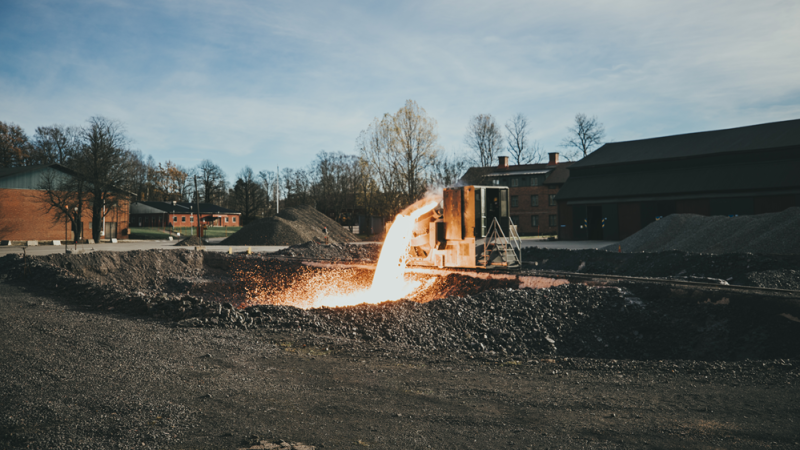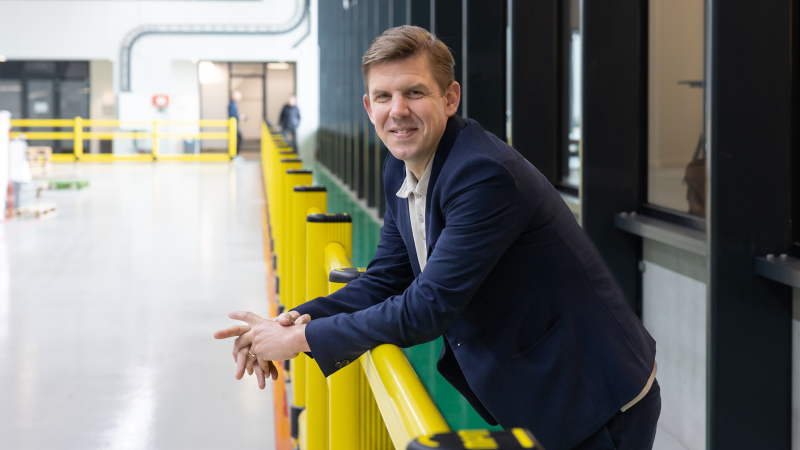This company begins with a tale of two Gordons, Gordon Furniss and Gordon White, who were both foundry workers. In 1980, they were faced with a problem – the foundries they worked at were shutting down. But where there is a problem there is also an opportunity. Gordon Furniss was an expert in nickel-based alloys, particularly a nickel and copper alloy called “Monel”. He also had a contact with a company that needed Monel castings. They forged an agreement that if Furniss established a foundry to manufacture castings, they would support it, providing the business’s first orders and the financial support to get it off the ground.
Working with Gordon White, Furniss made Furniss & White Foundries Ltd a reality.
Eventually Gordon White sold his share of the business to Furniss, who had two sons and a daughter coming into the business, and the company continued to grow.
Over the course of the 1980s development in the North Sea continued to expand, bringing with it a market for valves and pumps that required the precise kind of casting that Furniss & White provides. At the same time, research into new alloys was yielding exciting results in the form of Duplex and Super Duplex that could withstand the corrosion of the North Sea.
Today, Furniss’s grandson, Sam Scholes, is the Managing Director of the company.
As Scholes tells us, one of the next big breakthroughs for Furniss & White came during the 90s. As work in the North Sea grew, Statoil, later known as Equinor, developed a qualification procedure to certify manufacturers who could build to the appropriate quality levels North Sea operations required. In the late 90s, Furniss & White quickly became one of the first companies to achieve two grades of approval under Equinor’s standards.
“This gave us an open door into the extensive market of the North Sea, particularly with Equinor developing the Norwegian fields,” Scholes reports. “They were the forerunners of this technology, so a lot of other end users used the Statoil model to verify manufacturers. So, in having the NORSOK qualifications we were well positioned to supply into those markets.”
Those qualifications, while impressive, are not all that Furniss & White Foundries has to offer. What sets the company apart is the highly flexible manufacturing facility to work with.
“We can take a design or model from a customer and produce it in steel, stainless steel or nickel-based alloys,” says Scholes. “We can make it as a finish machined component, a raw casting or weld fabricated component. Everything is on-site, giving us an edge on price and lead times while attaining the quality levels expected in the industry.”
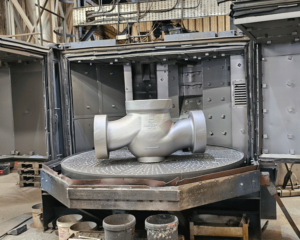 High Approval
High Approval
As Furniss & White grew it was able to offer other customers a full-service package backed up by years of industry know-how. However, since then it has also faced a gauntlet of other challenges.
“When I started at the company in 2007, I waltzed straight into the financial crash,” Scholes jokes. “We got through that and then in 2015 we saw the oil crash, then Covid and the Russian war.”
Furniss & White has managed to navigate all these challenges, but the company’s primary focus has always been on the job it does best.
“One of the biggest orders we ever had was a couple of years ago, for a grade called CX2MW, more commonly known as Hastelloy C22,” Scholes tells us. “We were tasked with achieving both NORSOK and DNV approval to enable us to manufacture it.”
Furniss & White already had approval to make castings with a maximum section of 65 millimetres and 180 kilos net weight. But to achieve the required standard here they would need to make castings with a maximum section of 150 millimetres and 2.5 tonnes, a substantial jump up.
“It set us on a year-long Research and Development program,” Scholes says. “We had to change the chemistry of the materials in line with the specification, looking at how we made and processed the castings to maintain the quality levels on the larger parts, all while achieving the necessary mechanical properties.”
The final qualification was to make a “sacrificial casting” that would be cut up and examined to ensure it was of the correct quality.
“We got the certificate with NORSOK and DNV,” Scholes says. “As far as I can see we are the only company in the world to have that qualification with both companies. It was a great achievement that we learned a lot from, and it has served us well in subsequent years in helping other customers achieve those alloys.”
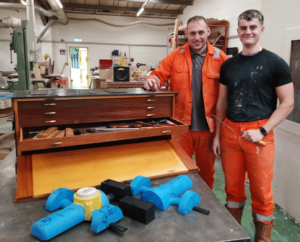 Casting a New Generation
Casting a New Generation
These kinds of results are not possible without a trained, experienced team with all the required expertise.
“The nature of the business is very hands-on, we don’t have armies of robots,” Scholes says. “It’s low volume, with people making over 100 different parts a week in a variety of alloys. The job relies on skilled manual labour.”
Finding that skilled labour is a growing challenge.
“It’s no secret that UK engineering firms are finding that difficult at the moment,” Scholes acknowledges. “I sit on the council of the Cast Metals Federation, where we have a state of trade meeting, and that’s often one of the big bugbears. Part of it is because heavy engineering is seen as a place where a less pleasant work environment meets technically challenging intellectual requirements and hands-on practical skills.”
Scholes believes the work itself is rewarding, however.
“It is very interesting once you get into what is actually going on,” he explains. “The technology is old, but the understanding of it is high temperature science.”
The most valuable tool Scholes has found in finding the people Furniss & White needs is word-of-mouth.
“Our most successful recruiting has been through recommend-a-friend type recruitment,” he says. “If you get someone who already works here who can reference their friend, that goes a long way.
The person who’s applying also knows what the foundry is because their friend has told them all about it.”
This is combined with a general apprenticeship program that invests in the grassroots of the industry. It is an industry facing challenging times, as a brief, Covid-inspired retreat to domestic manufacturing has begun to swing back to more work being outsourced to cheaper foreign foundries.
“We have an edge when it comes to high end, low volume, high risk, nickel-based alloys,” Scholes says. “If the price of nickel in the UK is £15 a kilo it should be the same in India, assuming global economics is functioning. They are expensive alloys, and the risks of melting and pouring are much higher. That closes the gap between those economies and the UK, and we can definitely beat them on lead time.”
With a lot of business in the oil and gas sector, and a lot of potential in the nuclear and defence markets, Scholes looks to a strong future for the company.
